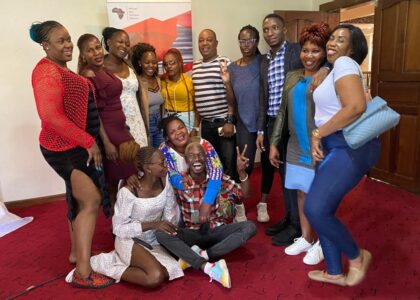





The South-South Learning network (SSLN) is an initiative of the Global HIV Prevention Coalition (GPC) under UNAIDS, funded by the Bill & Melinda Gates Foundation, and implemented by Genesis Analytics and the University of Manitoba.







The South-to-South Learning Network (SSLN) has the opportunity to keep supporting countries in HIV prevention in the future and also aims to strengthen country HIV prevention programmes through shared learning of good country practices.
African Sex Workers Alliance (ASWA) and her members were honored to be part of the 3rd Regional Meeting with 70+ HIV preventions leaders across 10 African countries. After two years of only virtual engagements due to travel restrictions, these country champions were finally able to meet and engage in person in Nairobi from 21st to 24th February 2022.
Sex workers leaders from ASWA secretariat, Zambia Sex Workers Alliance, SISONKE, Kenya Sex Workers Alliance among others and also Sex Workers SSLN Champions engaged with peers working in government, implementation, civil society and development organisations in Africa, reflected on the past years with the network and learned about new initiatives and promising practices in HIV prevention in Africa.
Kerry Mangold SSLN Programme Director gave an overview of the status of the African HIV prevention in the African countries and SSLN African HIV prevention journey. She urged all to stay engaged and be actively involved in the future of improved HIV prevention programming in Africa.
Mary Mugambi Kenyan Champion and also from the National Aids STIs and Control Council (NASCOP) said that there was a need to recognize key partners in HIV response. She added that the key population including sex workers continued to be marginalized.She said that the national HIV prevention responses should be a collective effort and aligned to a human rights-based approach.
Jani Swart SSLN asked the participants to identify their personal wish list and also their roles in the HIV response. She added that there was a need for a size estimate for other subtypes like the Trans community.
Measuring outcome data: what, when and how to measure data was discussed.
A question on why there was a disconnect between HIV prevention scores and outcomes was posed.
It was noted that though decriminalization of sex work is a long-term goal, we should enhance knowledge sharing among sex workers perpetrators.
Dr. Mike Ekisa Chair of County AIDS and STI Control Officers (CASCOs) in Kenya said top-heavy coordination involving the top government officials who are so busy with other engagements and not the response in HIV prevention would land HIV response into red tape and slow the speed in HIV prevention.
It was also discussed that for sex workers’ HIV response in Africa to be successful, the existing successful structures, systems and models on HIV response should be involved and upscaled to other African countries.
It was said that the African HIV response needed the coordination of multi-sectoral HIV responses from the national to the grassroots level and that it should be well-documented coordination. The participants were urged to coordinate and not control.
Proposed coordination strategy/structure for HIV prevention responses in Africa
- Develop National AIDs and STIs Councils and Programs
- Develop HIV national frameworks/strategies
- Establish technical support units at the National, Sub-National and local level and provide technical support/guidance. Differentiate those technical working groups e.g one for sex workers, another one for Trans community.
- Establish Advisory National/Sub-National Committees -legal, training on curriculum development for sex workers
- Initiate HIV Commodities Program e.g. Condoms and Lubes
- Initiate platforms like SSLN where best practices could be shared.
Find the presentations here:


